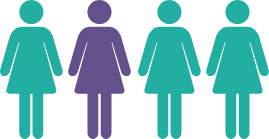
Not a real caregiver
or patient.
BRCA by the Numbers
About 1 in 4 people with ovarian cancer has a BRCA mutation.
Types of BRCA Mutations
There are two types of BRCA mutations: BRCA1 and BRCA2. These can be inherited or acquired:
- Inherited or familial mutations are passed on from parents to children. These are also called germline mutations and are present in the DNA of every cell of anyone who inherits them
- Acquired mutations are when the BRCA gene mutates randomly at some point during a person’s life
Different tests are available to determine if you have an inherited or acquired BRCA mutation.
- These mutations may be passed down from parents (mothers or fathers) to their children (sons and daughters)
- When BRCA mutations are inherited, they are present in every cell in the body from the beginning of a person’s life
- Mutations can be found in blood, saliva, or tumors
- You may hear your doctor also call inherited mutations “germline mutations”
- These mutations develop at some point during a person’s life
- That means they are not passed down by a parent and cannot be passed on to future generations
- Acquired BRCA mutations are only present in the tumor cells
- You may hear your doctor refer to acquired mutations as “somatic mutations”
Types of BRCA Mutation Tests
Genetic tests only identify inherited BRCA mutations. This test can be used to inform treatment decisions if you have certain types of ovarian cancer. A blood or saliva sample will be collected for a genetic test.
Your family members, both male and female, can also benefit from knowing if you have an inherited BRCA mutation. Talking to your family about your BRCA status can help them decide if they want to be tested for a BRCA mutation. This could help them make informed decisions about their health like when they should start screening for certain cancers.
Tumor testing can find both inherited and acquired BRCA mutations. Another name for a tumor test to detect BRCA mutations is called a “genomic test.” This test can be used to inform treatment decisions if you have a certain type of ovarian cancer. A tumor sample will be collected for a tumor test.
If you test positive for a BRCA mutation with a tumor test, your doctor may follow up with a genetic test to see if this mutation runs in your family.
When it comes to BRCA mutation testing—don’t wait. Getting a BRCA mutation test early can give your doctor important information that can help you get the treatment that’s tailored for you.
Who Should Consider BRCA Mutation Testing?
If you have been diagnosed with ovarian cancer, knowing if you have a BRCA mutation could make a difference in your treatment. Your BRCA status is a clinical characteristic your healthcare team can use to make decisions about your treatment plan.
These national guidelines from the following organizations recommend that certain people with breast, ovarian, and prostate cancer get BRCA mutation tested:
- National Comprehensive Cancer Network® (NCCN®)
- American Society of Clinical Oncology
NCCN makes no warranties of any kind whatsoever regarding their content, use or application and disclaims any responsibility for their application or use in any way. Referenced with permission from the NCCN Clinical Practice Guidelines in Oncology (NCCN Guidelines®) for Genetic/Familial High-Risk Assessment: Breast, Ovarian and Pancreatic V.3.2024. © National Comprehensive Cancer Network, Inc. 2024. All rights reserved. Accessed February 20, 2024. To view the most recent and complete version of the guideline, go online to NCCN.org.
A family history of certain cancers, such as breast, ovarian, and prostate cancers, may suggest that a BRCA mutation runs in your family. Genetic testing can help you understand your risk of developing certain cancers. This can help you and your provider make informed healthcare decisions.
BRCA Mutation Testing in Ovarian Cancer
When should I get tested for BRCA mutations?
- Testing after diagnosis can help inform your treatment plan
- Even if you have already started cancer treatment, you can still talk to your healthcare team to see if you should consider BRCA mutation testing
How do I get tested for BRCA mutations?
- Your healthcare team will help you schedule an appointment for BRCA mutation testing
- Depending on the type of test your doctor orders, a blood, saliva, or tumor sample will be needed, which will then be sent to a lab. The results may take a few weeks to come back. Your healthcare team will discuss what your results mean and go over your treatment options
- Your doctor may recommend testing for HRD, which can also detect BRCA mutations in patients with ovarian cancer. Your HRD and BRCA status can inform maintenance treatment decisions
If you test positive for an inherited BRCA mutation, a genetic counselor can help you determine the best testing strategy for you and your family.
Talk to your healthcare team about getting BRCA mutation tested. Knowing your results could help you find a treatment that may be right for you.
BRCA Mutations and Ovarian Cancer Treatment
Talk to your doctor about getting BRCA mutation tested. Knowing your results could help you find a treatment that may be right for you
Here’s what you need to know:
- Knowing that you have a BRCA mutation could determine if you are eligible for certain targeted therapies
- If you have a BRCA mutation, you may be eligible for a targeted therapy called a PARP inhibitor
- Tumors that have BRCA mutations are more sensitive to PARP inhibitor treatment. PARP inhibitors work by causing DNA damage that cells with BRCA mutations have trouble repairing. This can cause cell death

Not a real caregiver
or patient.
Once your healthcare team receives your results, they will inform you of your BRCA status. At this point, your doctor may suggest next steps, depending on your results.
What Happens Next?
Once you’ve decided to get BRCA mutation tested, talk to your doctor. They will help decide if you fit the criteria to receive testing.


Not a real patient
or doctor.
Do you have questions about insurance coverage for BRCA mutation testing?


Not a real patient
or caregiver.
Looking for more support resources or information for BRCA mutation-related cancers?


Not real patients.




